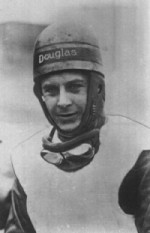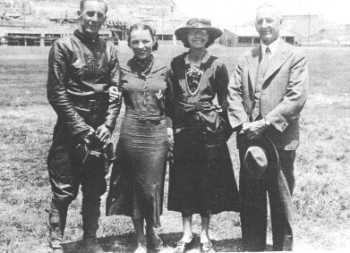

Refurbishing
Apologies for the dropsheets, paint tins and scattered detritus. More information...

Vic was captain for Wimbledon races for seven years when they first started team racing. Prior to 1930, the Australians clearly had the track all to themselves. Even experienced riders like Sprouts Elder had been pushed to the sidelines and he returned to America. Some British riders were prominent, Buster and Roger Frogley being among the best of them, but early records indicate the Australians were mostly unmatched.
For recreation the broadsiders turned to many things. Roller skating was popular and many spent their spare time thundering around the local rinks in England. But Huxley needed more. He turned to the air. Buster and Roger Frogley the British riders, and the unstoppable Charlie Spinks were all keen, but it was Huxley who was first to fly solo.
He hammered off the grass at Broxbourne, banked and climbed and was gone. Huxley had discovered another way to go fast - he loved to fly. The view was great, but on this flight the most important thing was to find some place in the middle of all that country to put down. The propeller was still and lifeless - the only noise was the rip of the wind in the wires. He had just enough height to make a wheat field, but there was a fence. He hauled back, almost stalled, then shoved the stick forward to bring the nose down again. Wheat stalks ripped at either side of the fuselage. As soon as the plane touched, Vic pulled the stick hard back into his stomach and hoped for the best. The little 'plane bumped and slewed, then the nose came down. The motion of turning over was much gentler than he had imagined it would be. Then he was over. His head jerked forward and his nose struck the compass hard, stunning him. Vic staggered out of the now upside down aircraft, blood streaming from his face. The next day he rode again at the speedway - and won.
Vic Huxley captained the Australian team against England nine times in succession. In 1930 he won eight major championships and a score of other prizes. Prize money for these was usually about 100 pounds each - a considerable sum in those days. His winnings were well over 5000 pounds a year - a small fortune in 1930. He was possibly for a time the highest-paid sportsman in the world.

Vic met his wife in London in 1929. They were married in 1931 and had returned to Queensland for a honeymoon on the Gold Coast. A telegram arrived from New Zealand requesting him to ride there, but Vic was reluctant to cut his honeymoon short. He replied with a telegram saying he demanded the World and the next thing he knew, his passage had been booked.
Left: Vic and his wife Sheila Kay King with Vic's parents when he was riding at the Speedway Royal Track in Sydney around 1930 or 1931.
Even with the machinery available today, many riders could well be envious of Huxley's times. When the British Individual Championship was organised in 1931 he was the first to win it. Second time around he lost it, after the greatest series of match races the sport has seen, to Jack Parker. He then regained the title - the only man to ever do so.
That he achieved all he did between the years 1921 to his last ride in Sydney in January 1936 with only one serious fall is remarkable - and indicative of the control he had over his machines.
Many years after his retirement, Vic Huxley's home housed none of his past trophies, not even a photo to remind him of his great past. They were all tarnishing in a shed in his back garden.
But it's not the gold and silver trophies that were important to Vic Huxley, nor was it the records; the few press clippings he kept were mostly about other riders.
Somewhere inside the modest man was the knowledge that he always did his best - that if he rode hard, he never rode over anyone, on the track or off it. But he must know he was the greatest rider the world has known - that he was without peer - that years after his last ride, the audience is still on its feet applauding.